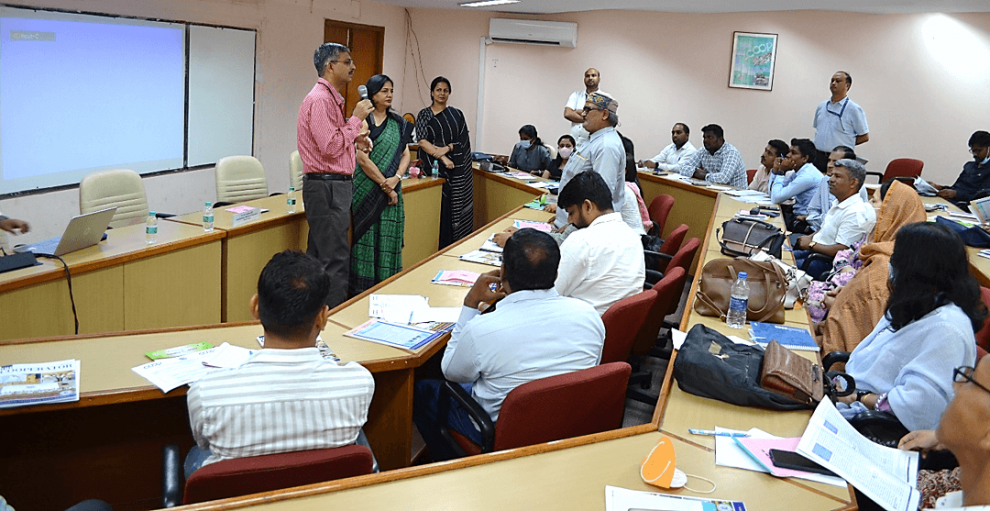Community-based institutions, such as cooperatives, SHGs, and FPCs are being promoted to address development challenges, but their growth is constrained by various factors. In this blog, K. K. Tripathy and S. K. Wadkar explore the importance of the ‘Cooperative Identity’ as the foundation of all collectives, and identify key indicators to ensure their professionalism. Extension professionals can play a very important role in this regard, they argue.
CONTEXT
Cooperatives and collectives are being introduced in developing countries to address developmental challenges and enhance living standards. India has the largest cooperative network in the world, with 854,000 units engaged in various activities (NCUI 2018). Various stakeholders are working towards promoting and forming cooperatives, Self-Help Groups, and community-based institutions. There is great potential to form cooperatives in emerging sectors of the economy. Researchers and practitioners have studied cooperatives and collectives extensively, highlighting their success stories, challenges, and good practices (AESA Blogs 13, 34, 110, 154, 156, 157; AESA Good Practice Note 56). In the agricultural sector, social enterprises face issues pertaining to size, scope, capital, talent, technology, market, governance, and management. The government-appointed committees have also identified critical points that restrict the growth of the cooperative sector, such as the lack of avenues for capital infusion, weak financial discipline, undue government and regulatory interference, inadequate advisory services, poor market connect, low adoption of professionalism, and substandard management.
In developing countries, it is crucial to have collaboration among stakeholders so as to overcome challenges and establish cooperatives, Self-Help Groups, and community-based institutions. Financial institutions and governments should extend their support to tackle issues related to capital, regulatory interference, advisory services, and market connections. Professionalism in governance and management is essential for cooperatives and collectives if their growth and sustainability is to be ensured. These organizations play a vital role in reducing poverty and promoting socio-economic development. India has recognized their importance and established a separate Ministry of Cooperation in July 2021 to provide administrative, legal, and policy frameworks to strengthen this sector. The Ministry has taken various initiatives (refer to Box 1) to facilitate the ease of doing business for cooperatives and expand their reach across the country. To sustain as member-driven and member-controlled business enterprises, cooperatives and collectives need to address operational and business-related concerns, while adhering to the fundamental values and principles of the ‘Cooperative Identity’.
 Group Exercise on Bye-laws preparation for Campus Cooperatives
Group Exercise on Bye-laws preparation for Campus Cooperatives
|
Box 1: Initiatives of the Ministry of Cooperation (Government of India) aimed at strengthening cooperatives 1. National Cooperative Policy: A national level committee, comprising of experts and stakeholders drawn from all over India was constituted to formulate the New Cooperation Policy to ensure creation of an enabling ecosystem to realize the vision of ‘Sahakar-se-Samriddhi’. 2. Model bye-laws for Primary Agricultural Credit Societies (PACS): Model bye-laws prepared and circulated for adoption as per the respective State Cooperatives Acts to enable PACS to undertake more than 25 business activities such as dairy, fishery, setting up of godowns, LPG/ Petrol/ Green energy distribution agency, banking correspondents, Common Service Centres (CSC), etc. 3. PACS as Common Service Centres (CSC): MoU signed between Ministry of Cooperation, Ministry of Electronics and Information Technology, NABARD and CSC – Special Purpose Vehicle (SPV)to facilitate functioning of PACS as CSCs to improve their business viability, provide e-services at village level, and generate employment. 4. National Cooperative Database: Preparation of an authentic and updated unit level data repository of cooperatives in the country started to facilitate stakeholders in policy making and implementation. 5. Level Playing Field to Cooperatives: Surcharge reduced from 12% to 7% for cooperative societies having income between Rs. 1 to 10 Cr; MAT reduced for cooperatives from 18.5% to 15%. Relief under Section 269ST of IT Act; Lowering tax rate from 30% to 15% for new manufacturing cooperatives; Increase in limit of deposits and loans in cash by primary credit societies and agricultural & rural development banks, etc. 6. Cooperatives as ‘buyers’ on GeM portal: Cooperatives permitted to register as ‘buyers’ on Government e-Market (GeM), enabling them to procure goods and services from nearly 40 lakh vendors to facilitate economical and transparent purchases. 7.Three New National Multi-State Cooperative Societies: Three new apex national multi-state cooperative societies established in the areas of seed, organic farming and export marketing, as umbrella organizations to give thrust to quality and climate resilient seeds, organic farming and its certification, and exports from cooperative sector. Source: Ministry of Cooperation, February 2023. |
COOPERATIVE IDENTITY: THE VALUES AND PRINCIPLES
In 1995, the International Cooperative Alliance (ICA) adopted the revised Statement on the Cooperative Identity which contains the definition of a cooperative, the values of cooperatives, and the seven cooperative principles (as described below).
Cooperatives are autonomous associations of persons united voluntarily to meet their common economic, social and cultural needs and aspirations through a jointly owned and democratically controlled enterprise.
 Inception meeting for establishing Campus Cooperatives at Bhagat Phool Singh Mahila Vishwavidyala-Haryana
Inception meeting for establishing Campus Cooperatives at Bhagat Phool Singh Mahila Vishwavidyala-Haryana
Cooperative Values
Cooperatives are based on the values of self-help, self-responsibility, democracy, equality, equity, and solidarity – all in the spirit of honesty, openness, social responsibility and caring for others.
Cooperative Principles
Cooperatives have considerable freedom to draw up their own bye-laws based on the Cooperative Law[1] (Act/Rules) and Cooperative Principles.[2] Cooperative Principles are a set of basic guidelines by which cooperatives put their values into practice. The seven principles are: Voluntary and open membership; democratic member control; member’s economic participation; autonomy and independence; education, training and information; co-operation among cooperatives; and concern for the community.
LESSONS FROM COOPERATIVE BUSINESS MODELS
Sixteen cooperative business models – across the credit and non-credit cooperative sector – have been featured in the ‘Turnover over GDP Per Capita’ category of the World Cooperative Monitor 2022 (WCM 2022). This includes IFFCO (Indian Farmers Fertilisers Cooperative Limited, New Delhi; Gujarat State Cooperative Milk and Marketing Federation (GCMMF), Anand, Gujarat; Krishak Bharati Cooperative Limited (KRIBHCO), New Delhi; seven State Cooperative Banks, namely Kerala, Maharashtra, Karnataka, Andhra Pradesh, Madhya Pradesh, Gujarat, and Uttar Pradesh; four Urban Cooperatives Banks: Saraswat Cooperative Bank, Mumbai; TJSB Cooperative Bank, Thane; Cosmos Cooperative Bank, Pune; and SVC Cooperative Bank, Maharashtra; and two primary societies, namely Buldhana Urban Cooperative Credit Society, Maharashtra, and Uralungal Labour Contract Co-operative Society Ltd. (ULCCS), Kerala.
 NCUI Cooperative Education Field Projects Experience sharing with SAARC participants
NCUI Cooperative Education Field Projects Experience sharing with SAARC participants
There is widespread recognition of these cooperative business models across the country. The learnings may be adopted and replicated to enhance and expand the capacities of cooperatives and collectives in India. Based on the interim analysis and observations, authors have identified the key lessons for adoption by other cooperatives and collectives, as follows:
- Standardization of business procedures and processes to undertake activities in a business-like fashion;
- Scaling-up – horizontal and vertical integration of business activities, and accordingly the governance and management structure evolved over a period as per the need of the members as well as demand from the primary cooperatives;
- Skilling – the way its members and personnel are treated, compensated and motivated. However, there is a still gap in terms of robust cooperative sector-specific HR policy, services and rules;
- Sustainable competitiveness – business diversification adhering to quality of products and services. There is still a lot of scope to develop products and services as per the changing needs and demands of members as well as the tastes and preferences of consumers;
- Self-regulation by complying with statutory and legal requirements.
DRIVERS FOR ACHIEVING PROFESSIONALISM IN COOPERATIVES
a. Through the lens of Cooperative Principles
Based on the ICA guidance note, the authors have decoded each of the cooperative principles and identified key indicators, which may be used for developing a code of conduct in order to boost professionalism. These are:
- Open and Voluntary Membership
- Provide information handouts to all members and prospective members without discrimination;
- Maintain and update a membership database;
- Develop an agreed set of rights and responsibilities for members in the form of a ‘Members Job Description/Members Agreement’;
- Establish a checklist for assessing members’ intent and provide mandatory training programs;
- Consider installment payment options for equity shares in high investment cooperatives;
- Ensure representation of marginalized and vulnerable sections of society;
- Maintain political and religious neutrality.
- Democratic Member Control
- Qualification for Board of Directors: educational and patronage/business participation;
- Skills mapping of Board of Directors to exercise effective governance;
- Clear delegation and distribution of authority between individual board members;
- Youth representation in Board and democratic renewal and retention of experience;
- Enabling employee unions’ representative to be on the Boards (functional director);
- Election Committeeought not to be appointed by, or be accountable to, the current elected Board or committee;
- Free flow of information related to meetings, agenda, minutes of meetings, financial reports, etc., to each and every member.
- Members’ Economic Participation
- Enabling members and non-members to invest in the cooperative society;
- Clear/agreed upon benefits structure, including non-financial benefits;
- No differential treatment between member-user, member-non-user, non-member user, or non-member non-user;
- Standard Operating Procedures (SOPs) for various aspects of business operations;
- Incentives to non-voting shareholder/investor member;
- Performance measures of cooperatives;
- Utilization of reserve fund and other funds.
- Autonomy & Independence
- Strong financial controls and investment appraisals;
- Maintenance of records books;
- Maintenance of statutory registers;
- Identifying business opportunities;
- Performance benchmarking with national and international businesses;
- Regular conduct of Board and General Body Meetings, and Audit;
- Legal Compliance as per business operations.
- Education to Members, Training to Board Members & Employees, and Information for Youth & Opinion Leaders
- Capability enhancement of members: Programmes, not only on cooperative identity, but also on the other aspects of social development such as(financial) literacy, gender sensitization, leadership development, etc.;
- Members to complete specific sets of training programmes so as to become eligible to stand for Board election;
- Technical, managerial, and functional skill assessment of members including Board of Directors and employees in line with the objectives/business of cooperatives;
- Intergenerational transitional training to attract new and young members;
- Recruitment, HR Policy and Service Rules including career progression and performance incentives;
- Informing politicians, public servants, media representatives, and educators about the nature of cooperatives and vital benefits of cooperatives for advocacy and lobbying;
- Integration of cooperative education in the National Educational System and linkages with universities to encourage research.
 ToT of Trainers of State & District Coop Unions on Training Methodology
ToT of Trainers of State & District Coop Unions on Training Methodology
- Cooperation among Cooperatives
- Collaborating with sectoral cooperatives and collectives to economise scale of production and marketing, as well as with inter-sectoral linkages and other business players or value chain partners;
- Local resource mapping and networking with business entities in locality and similar industries to share intelligence, best practices, and to brainstorm solutions to address key issues;
- Establishing federations and/or becoming member of federal cooperative organisations (district, state and national level);
- Finding and referring new business opportunities to other cooperatives;
- Performance demanded from, and support to, primary cooperatives;
- Creating and participation of local, regional campaign and cross sector events;
- Soft loans/grants and technical assistance by larger/well-established cooperatives to rehabilitate defunct cooperatives and promote cooperative start-ups.
- Concern for Community
- Embracing diversity, equality and inclusion;
- Ensuring access to healthcare, social welfare and other essential services to members, employees, and to non-members as well;
- Concern about employees – employment policies, procedure, adhering to health and safety standards for workers and employees, etc.;
- Mechanism to fulfill youth aspirations;
- Mechanism to achieve sustainable development – economic, social and environment;
- Promoting peace and social justice, and helping to build civil society;
- Activities undertaken as part of social responsibility given in the Annual Report.
B. Through the Lens of Cooperative Legislation
The National Cooperative Union of India’s (NCUI) 2022 study identified key provisions followed in few states that could be implemented in all states to promote uniformity in cooperative regulation, enhance professionalism among cooperative members, directors, and employees, and improve the ease of doing business for cooperatives. These are:
- Recruitment reforms to ensure selection and up gradation of competent professionals and workforce
To adapt to changing economic policies, there is need for a paradigm shift in the management of cooperatives and collectives. A Recruitment Board/Cooperative Service Commission could be established so as to recruit competent professionals transparently. Competent professionals are required for educating people on the benefits of cooperation, how to run cooperatives as a business, and maximize economic returns to members. Additionally, cooperatives need to shift towards member-owned and controlled self-reliant and self-regulatory organizations and away from political and state interference. To succeed in the market, cooperatives need to adopt quality and excellence as prerequisites, use advanced technologies, innovate and explore new business opportunities. Finally, problems arising from divergent actions of members and federal bodies can be resolved through member education and healthy dialogue.
 NCUI Faculty Development Programme on Cooperative Management
NCUI Faculty Development Programme on Cooperative Management
- Electoral reforms to ensure fair and transparent election of Board of Directors
To achieve professional cooperative management, simply appointing professionals is not enough. The Board of Directors must ensure that the cooperative is being run well and in the right direction. A ‘Cooperative Election Commission/Authority’ should be established to supervise elections. Directors must understand their responsibilities, act in good faith for the benefit of the cooperative, understand the business plans and industry changes, monitor operations, examine the cooperative’s value and transparency, seek expert advice, establish long-term objectives and systems, and review financial information. Directors must also maintain the cooperative’s integrity, reputation, and accountability.
- Online registration and amendments of bye-laws and compliance to ensure ease of doing business
Some States/UTs have made provisions for online registration, but due to lack of digitization, the cooperative registration process ranged from30 to 120 days, in comparison to a Private Company which gets registered between 7 to 10 days. In addition, the provision of ‘deemed registration’ beyond the stipulated time period of registration may be made mandatory in all States/UTs. The period for amendment of bye-laws ranges between 30 to 90 days, wherein ‘deemed acceptance’ of amendments may be made compulsory in all States’/UTs’ Acts.
- Establishing partnership and subsidiary to infuse capital and ensure business diversification
The Cooperative Laws should be permitted to organize cooperatives through partnerships with private or public limited companies or other community-based institutions/ agencies, without impacting the cooperative identity. This will support the accumulation of the required funding and create a win-win business model for both cooperatives and other business entities.
- Adoption of uniform accounting and auditing standards to give a true and fair view of the state of affairs
Books of Accounts, financial statements and other relevant papers for each financial year, which give a true and fair view of the state of affairs of cooperatives, must be kept on accrual basis and double entry system of accounting, comply with the standards issued by the Institute of Chartered Accountants of India (ICAI), and shall be in the requisite form(s) as may be mandated for different types of cooperatives. The Cooperative Law must insist on adherence to accounting and auditing standards and every auditor must comply with these Auditing Standards.
- Attracting and retaining youth in cooperatives
There is no provision for promoting ‘Coop Startups’. If youth and women are to be drawn into the cooperative fold, cooperatives as legal entities need to be considered under the definition of ‘Start-up’, in order to get access to the benefits of the start-up ecosystem.
ROLE OF EXTENSION PROFESSIONALS
Extension professionals can play a vital role in strengthening the cooperative as an institution and a business enterprise. These include:
Facilitating genuine community participation: Currently, while forming and promoting new collectives the focus is on achieving targets rather than on making a community realize what their felt and unfelt needs are for coming together, especially with regard to enhancing and expanding their livelihood opportunities. So, extension approaches and participatory methodologies may be used for awareness generation and social mobilization of farmers in order to inculcate a sense of ownership and belongingness, which is fundamental to ensure their active participation not only in the formation and promotion of community-based institutions but also in the business affairs of the enterprise.
Promoting vision mapping and leadership development: Another core aspect while establishing a strong foundation for cooperatives and collectives’ business enterprises is ensuring good governance.
Identifying and nurturing social entrepreneurs: Cooperatives and collectives are often misconstrued as entities led and governed by senior aged members. In order to ensure renewed life to this ageing movement, youth and women must be oriented towards the nature and benefits of these social enterprise models that can fulfill their aspirations as individuals, community and society as a whole.
Assist in realising the full potential of cooperatives:To promote the potential of cooperatives, it is important to create awareness and build capacities through education and training. Cooperatives should be assisted in developing business plans, improving productivity, and accessing markets and finance. It is also essential to educate members on financial management, establish effective processes and systems, and assist them in fulfilling legal requirements. Providing technical know-how and recruiting competent management professionals can help improve the quality of goods and services produced. Finally, cooperatives should be encouraged to self-regulate by assisting them on the statutory and legal requirements.
Piloting new cooperatives in emerging areas: New ‘Commodity Cooperatives’ in emerging areas, such as renewable energy, service sector, industrial and manufacturing sector, tourism, etc., need to be identified and pilot tested for formation of area-specific cooperatives. In addition, there is tremendous scope in the social sector which is not economically viable for other forms of private enterprises. The USP of cooperative is “primacy of people over profit”, wherein cooperatives can reduce costs through the voluntary participation of their members.
END NOTE
Professionalism of cooperatives and community-based social enterprise is not merely a prerequisite but a permanent condition for ensuring sustainable competitiveness of their business enterprise as well as for evolving as a self-regulatory organization. There is vast scope for extension professionals to pursue their career in various managerial positions in the cooperatives/collectives as well as in the cooperative departments of the State and Union Governments. Let’s cooperate, collaborate and take collective action to make cooperatives and collectives Aatma Nirbhar.
 NCUI & CICTAB: ToT on Training Techniques
NCUI & CICTAB: ToT on Training Techniques
References
- 1995. Cooperative identity, values & principles. Retrieved from https://www.ica.coop/en/cooperatives/cooperative-identity
- 2017. The Guidance Notes on the Cooperative Principles. Retrieved from https://www.ica.coop/en/media/library/research-and-reviews/guidance-notes-cooperative-principles
- 2022. Exploring the cooperative economy report 2022. World Cooperative Monitor. Retrieved from https://monitor.coop/sites/default/files/2022-11/WCM_2022.pdf
- 2022. Comparison of State/ UTs cooperative law. Report submitted to the Ministry of Cooperation, Government of India.
Foot Notes:
[1]First Cooperative Law was introduced in 1904 for credit cooperatives, which was subsequently repealed to include all types of cooperatives in 1912. The cooperative as a subject transferred to the State List in 1919 and after that every state has had its own Cooperative Society Act, based on the 1912 declaration and the then Bombay State Cooperative Society Act 1925.
[2]Cooperative Principles were formed in 1844 by the Rochdale Pioneers Cooperatives Society, Manchester, England, that were subsequently formalised and modified by the International Cooperative Alliance (ICA) as per the changing times and needs – in 1937, 1966 and 1995.
 Dr. K. K. Tripathy (IES) is Officer on Special Duty (OSD) to the Minister of Cooperation, Government of India. (Email: tripathy123@rediffmail.com), (Views are personal).
Dr. K. K. Tripathy (IES) is Officer on Special Duty (OSD) to the Minister of Cooperation, Government of India. (Email: tripathy123@rediffmail.com), (Views are personal).
 Dr. S. K. Wadkar is Adviser to the National Cooperative Union of India, New Delhi. (Email: sagarkwadkar@gmail.com).
Dr. S. K. Wadkar is Adviser to the National Cooperative Union of India, New Delhi. (Email: sagarkwadkar@gmail.com).





“Cooperatives are basically established to protect the interests of both the producers and consumers thereby reducing the exploitation by the middlemen. Thanks to the authors Drs K K Tripathy and S.K. Wadkar for coming out with a good blog indicating various initiatives being taken up by the Government of India (GoI) to sustain the Cooperatives and farmers initiatives. The most important one is formulation of a national policy on cooperatives with the involvement of stakeholders and experts. Hope, the GoI will come out with an appropriate cooperative policy.
The most important reasons for the failure of dairy coops in India is that the members do not consider that they are the owners of the Societies. As is well known the other important reasons are the Government interference in the management of cooperatives and violation of the principles of Cooperation. Kindly refer to the AESA Blog 102 – Dairy cooperatives at the cross roads- https://www.aesanetwork.org/dairy-cooperatives-at-the-crossroads/.
The recent AMUL and NANDINI controversy is a clear violation of the principle “Cooperation among cooperatives”.
Based on the recommendations of the Y K Alagh Committee, the GOI has been promoting hybrid mode of cooperatives (milk producer companies) and the authors would have given some idea about the performance of these producer companies.
Thanks to AESA for publishing this blog.